Exclusive on: CosBeauty, The new PMS: Positive Mental Strength

Nutritionist, author and expert speaker on all things health and wellbeing, Michele Chevalley Hedge shares her top tips on bolstering mental health in the time of COVID-19.
There are many things we can’t control during the coronavirus pandemic, but we can control what we eat, how that affects our sleep and the knock-on effects on our mental health.
In these times of working and learning from home, we require mental stamina and a positive mindset to succeed. We need to have a mentally fit mind if we are to maintain structure to our workday, homeschool our children and set boundaries on how often we go to the pantry.
There are many factors to improving our mental positive mindset – meditation, sleep, exercise, illnesses and even genetics, but most important is food and its nutrients. If the brain is well nourished, our thoughts are clearer and calmer, and we push into a proactive, positive mind-set. Good nutrition has the power to influence:
- Meditation – how are we able to meditate, be present or mindful if we are on a sugar swing from picking up healthy-looking foods packed with hidden sugar
- Sleep – whole real foods rich in protein like fish, grass-fed meats, dairy, cheese, legumes breakdown to an amino acid called tryptophan which is a precursor to our sleep hormone called melatonin
- Exercise – ask yourself are you more like to exercise after a good night sleep and do you really feel like exercise after too much food or food that doesn’t make you feel strong, positive and energised?
- Genetics – did you know that you should not let your genes affect your jean size or your mental resilience? Research is showing stronger links between a positive mindset and a healthy body and brain rather than looking at your genetic history. In other words, we can influence our genes by what we eat.
Does food affect my mood?
New research has shown for the first time that the part of the brain used for learning, memory and mental health is smaller in people with unhealthy diets. The results of the study by researchers at Deakin University and the Australian National University (ANU) suggest that older Australians with unhealthy diets have smaller hippocampi – the hippocampus is a part of the brain believed to be integral to learning, memory and mental health. It has also shown that older people with healthier diets have larger hippocampi. The professors of this study said that as the negative impact of unhealthy foods on the waistline of the population grows, so does the evidence suggesting that our brain health is also affected.
Categories
- A Healthy View (507)
- Breakfast Recipes (22)
- Chicken Dinner Recipes (29)
- Chilli Recipes (5)
- Christmas Recipes (14)
- Curry Recipes (8)
- Dessert Recipes (20)
- Dinner Recipes (113)
- Easter Recipes (9)
- Energy & Vitality (4)
- Free Recipes (232)
- Gut Health (11)
- Hormone Health (17)
- Media (86)
- Mental Health (30)
- Mexican Recipes (11)
- Nutrition (205)
- Productivity (5)
- Salad Recipes (9)
- Sauce & Dip Recipes (12)
- Seafood Recipes (12)
- Sleep (7)
- Soup Recipes (12)
- Snack Recipes (56)
- Stress (2)
- Sugar (14)
- Weight Loss (36)
- Workplace Wellbeing (26)
- Brain Health (3)
- energy (1)
- calories (1)
Ready to take the next step?
Explore our full range of wellbeing courses and start your journey today.

Michele Chevalley Hedge is a qualified Nutritional Medicine Practitioner, speaker, and best-selling author has delivered 600+ keynotes for leading global brands, including Microsoft, Accenture, American Express, Apple, ANZ, CBRE, the Australian Government, and more.
Michele’s nutrition retreats, wellness courses, books, articles, and corporate health programs are backed by peer-reviewed research on workplace well-being, nutrition, stress, and mental health. A regular guest on Channel 7, Sunrise, and The Today Show and contributor to The Sydney Morning Herald, Body & Soul, and The Daily Mail, Michele is also an Ambassador for Cure Cancer and the Heart Research Institute.



0 comments
Leave a comment
Please log in or register to post a comment